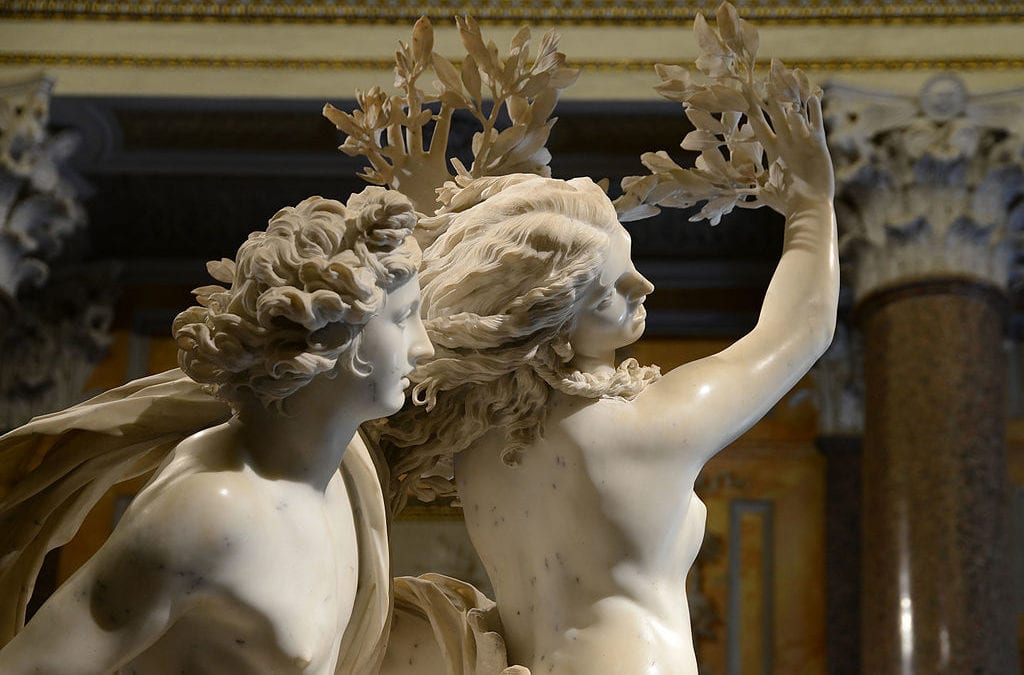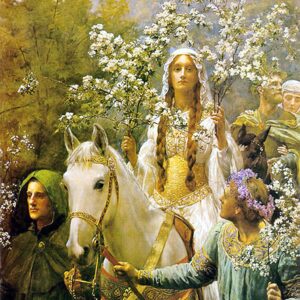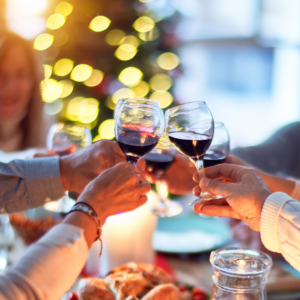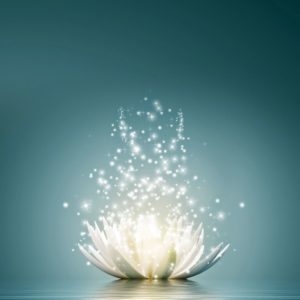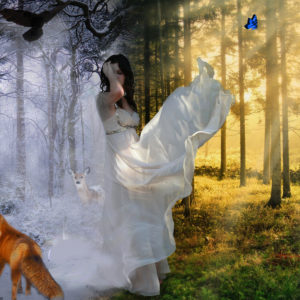Image Source: Galleria Borghese, CC BY-SA 4.0 <https://creativecommons.org/licenses/by-sa/4.0>, via Wikimedia Commons
This text is taken from the transcript of an interview I did for Maitrea, Prague, in 2018. Apologies in advance for any typos!
What can one expect from a deep imagery and myth workshop? How does it work?
In my workshops, I use storytelling. I tell the stories. I tell the myths. Stories are meant to be told. Each time, I draw on the “standard version” of the myth but what comes through me is something else, something deeper, apt to the moment and the group I am with. And, after telling the story, I guide the group to meet the story or myth in the imagination and see where it hits home. We look for the part which resonates, the piece that speaks to you, about your life, right now. The deep imagery process takes you from thinking about the story into experiencing it. It helps you get inside it and it inside you. I trust people will find their own wisdom and something may strike them in a completely different way than I could even imagine. There is no right version. There is only what is true for each person. I tell people that they too can tell this tale. They can re-tell it, re-write it, change it as needed. Myths are alive and each of us is a storyteller.
Deep imagery allows us to enter powerful images and myths. We can perceive them on the verbal level, but we can take them home inside ourselves and meet them on the level of dynamic images that enrich our experience. The workshops can be lively and a lot of fun, as well as offering insight. On the one hand, it is very deep, serious and powerful work, but it also loosens us up, and can be full of joy and humour and opens us to the unexpected.
How can it help women if they understand the darker aspects, the “nasty” feminine sides?
I find mythology interesting because it is alive. Some people describe mythologies as living symbols. I focus on how it describes relationships.
Sometimes we can look at how it shows relationships in society and sometimes we can see it as reflection of internal things.
In our Western society, in America and Europe, women are expected to be nice. We are expected to do nice things, to be sweet and kind – “feminine”, as people often say. Instead of embracing a woman as a whole being, only the sweeter parts are emphasized.
But mythology brings us stories of feminine figures that are powerful, dark, juicy, and sometimes opposed to masculine figures, sometimes just solely themselves, doing what they need without heed of others. In cultures that are most comfortable with a soft, feminine woman, these so-called dark goddesses can wake us up, can shift our perspective and can open doorways within us to new ways of being female.
Can you give us an example of such a story?
Tiamat, a Babylonian goddess, has sort of a bad reputation. She is linked to sea water and her husband Apsu is fresh water and together they give birth to the first generation of gods and then the next one. This idea of mixing waters seems very beautiful to me. Tiamat is the saltier water and Apsu, the sweet water. In some ways, it is almost a reversal of how our culture imagines gender roles. But both are needed to create. It is imagery or symbolism with many, many layers.
However, there is a disagreement in the family. At first, Tiamat is very conflicted, because she sees what the younger generation of gods wants, but she also knows the needs of her husband. This is such a typical position for women – their care embraces generations and they have empathy for all involved and wonder what to do about it. Anyway, when Tiamat’s husband gets killed by his grandson, she is furious. Many women find themselves angry about how their spouses or children are treated. But society often does not want us to get angry. Culturally, we are more comfortable with the gentler, grieving caring women who doesn’t raise her voice … think of Mary at the foot of the cross… than with the ones who would destroy everything with their rage.
Often, in these stories of angry women, they get defeated by male heroes. They are regarded as nasty, evil, troublesome females and it is felt that they should not have rebelled. They should have understood. But consider it! What would you do if your life partner was murdered by your grandchild? If my husband got killed by his own grandson, I would be angry!
I want to uncover these myths, forget it is about gods and goddesses. What does it feel like for a woman when conflicts arise? If she gets angry, is the anger accepted? And if it isn’t, what happens? The general milieu suggests that we shouldn’t get angry or if we do, it should be contained. But what about rage? What about the energy that can destroy and then create the world anew? What about anger? if we do discover our angers, it is helpful to find out how we can use their power. These stories can open our eyes to new possibilities.
This sounds like something very healing and empowering for women. And it can also be beneficial for men to see women regain their power, but at the same time, they can find it a little frightening. Is this sort of a masculinity crisis – the fact men want strong women, but they are afraid of them?
Yes, strong women are often portrayed as nasty and evil and that is where men can find it difficult. The second part of this is that in our culture, men are expected to be so strong all the time. They are taught to be warrior heroes, and culturally, we never step away from this warrior mentality.
,
For a warrior, it can be very difficult to hear the softer feminine voices. In Ireland, where I come from, there is a famous mythological figure, the warrior Cú Chulainn, who refuses to listen to what women tell him. He discounts his wife and his lovers’ wisdom. He kills his own son and his best friend in the tale. But he is still the hero, dying alone, refusing the insight of the feminine.
Our culture teaches men to be these strong warrior types, which is fine if you are going to a battle. But we seem to forget the peaceful life, the home life – the life in our communities is not just war. We need to find relief from this energy of fight – and this doesn’t apply to men only.
Look at people and their work: the feeling we need to be in charge and do things, we need to defend. There is this sense we are in a battle. The idea is to explore these opposing energies. We all need more completeness in our lives – whether women or men.
How can we recognize and understand these energies?
Mythology helps by allowing us to discern the larger patterns. One of those is the boasting and accompanying belittlement of those deemed as the enemy, the lesser ones, the impediments. This type of energy is rife in our culture. People are expected to be always ‘on.’ They are expected to boast, to sell themselves. That is an interesting phrase, isn’t it? to sell ourselves? Additionally, it seems to be more and more acceptable to demean others. Look at Twitter. Look at Facebook. Mythologically speaking, these are all indications of the warrior archetype. Think of David and Goliath, of Gilgamesh and his boasts.
But myth also allows us see alternatives. It also describes the way home.
Cú Chulainn, whom I have mentioned, returned from the battle full of this warrior energy. No one around him could be safe. Warriors fear he might attack them and they go to the queen. She waits for him and when he arrives in his chariot, roaring what a great warrior he is, she and her ladies strip naked. He can’t cope with it and turns his eyes away from them – it is the strength of women who are completely open, completely in power of themselves. He gets distracted and the warriors grab him and put him in barrels of water – and water is a feminine symbol, by the way. The first barrel boils, the second one gets hot and the third one is just tepid. Then they dress him in usual clothes and take him home.
There is great power in this story. It speaks to a feminine presence that can take the battle stance away from the warrior. Nowadays, both men and women are on a battlefield. So were they in the past, probably, but they had a way of coming home. This is relevant for all of us: can we cool the hot energy of fighting? Can we find the way home? It might not be simple and direct. We no longer know how to tell people to return from war and go home.
In our world, the idea and energy of war or competition seems omnipresent. As a feminist, I sometimes get misunderstood for people thing that equality means that all women need to become fighters just as strong as men. But in fact, perhaps this world doesn’t need more fighters, but generally less competition and struggle.
The whole business world is a battleground; it has all that competition mentality. So I agree that equality is not about making everyone a warrior. Equality is a very fluid thing if you like. It has to honour energies people have. It is the battleground mentality that does not allow softer voices to be heard. And I don’t mean just women, it can also be people doing community work.
The warrior stance deals with everything as a direct challenge. He can’t hear you so sometimes you must get around him through trickery, going sideways rather than directly at this warrior energy. That doesn’t necessarily mean becoming as tricky as some goddesses in stories, but perhaps looking for a more indirect approach. Most human beings are very complex. Additionally, the world built on profit and finance is not really working for most people, it works for very few, in fact. We can benefit from turning more attention to everyday life – the family and community. Life is not all about glorifying warriors and competition or making more and more profit.
It can be quite similar in politics, right?
The expression “nasty women” was inspired by the final presidential debate when Donald Trump kept interrupting Hillary Clinton and called her nasty (2016). Women are called nasty and dismissed if they show they can be also strong. Culturally, only the warrior is meant to be the strong one.
Political debates are dominated by people – and not always men, but very often – who just keep talking and saying how great they are. If you look at mythology and old literature, it is what heroes do. They keep talking about themselves and they put down those they disapprove of. This language and attacks on other people are a sign we are caught in the warrior mentality.
It is the way women are called nasty when they say something people don’t want to hear or they say it in a tone people don’t like for some reason. This is how women are demeaned, and not only in the big world of politics, but in everyday life. “You are not pretty enough, you are too heavy…” Is this really the point, is this more important than what the woman is saying? They get silenced and demeaned – and that’s an important thing to pay attention to.
Understanding these archetypes is vital for our personal growth, but it may also be helpful in the future world for practical reasons. For example in terms of jobs: a lot of work is getting automated, but we are also facing an aging population, so more jobs focused on nursing will be necessary. Can people who come to your workshops feel these changes? The fact that care might become more important than production?
It is so true these things are no longer prioritized. We do not seem to see the dividing line between a battlefield and home and understand that home and community are also important. If you look at how budgets are done by governments in many countries, a large part goes to the military and very little to education, care or social necessities. And also, there is this notion that jobs like nursing are not such a valuable career. We should ask questions like “What does the community need?” or “What does the home life need?”And it is not just about the aging population. Are we taking care of our children and childbirth? What do we prioritize?
Is the warrior energy always obvious at the first sight? Or are there more subtle versions of this archetype?
There is a fascinating story of Daphne and Apollo. Apollo, the Sun-god, and Eros, the love god. quarrel and Eros punishes Apollo by hitting him with an arrow of gold which makes him fall in love with the nymph Daphne, while she is hit by an arrow making her hate Apollo.
Daphne loves her free life in the woods but because of Eros’ arrows, Apollo begins to persistently follow her and tell her how much he longs for her, although she is not interested.
Now forget it is a story about gods and look at the situation: a young woman followed by a man who believes his feelings are the most important aspect of what is happening, and a young woman who is a victim of men’s competition. She keeps running and hiding and she is finally “saved” when she turns into a laurel tree.
Apollo takes the leaves and honors them. People seem to think the story is sad because Apollo’s love was never fulfilled, but it is actually much sadder for Daphne who was a victim: a victim of Eros who used her for his revenge and also a victim of Apollo who had no sense that the relationship was not about his feelings alone. Ultimately, Daphne loses everything she loves, her freedom to roam, to run to be like Artemis. She becomes a part of the woods she loves, but her independence and ability to run freely are taken away.
Many women can find themselves in a similar position with men who stalk them and do not care about their feelings and project on them what they, the men, want.
And it is not just stalkers but this myth comes into play anytime anyone of us turns another person into an object. When another person’s feelings or experience is discounted, we participate in this myth. When we use another person, for revenge, or in order to gratify just our needs, we participate in the myth.

